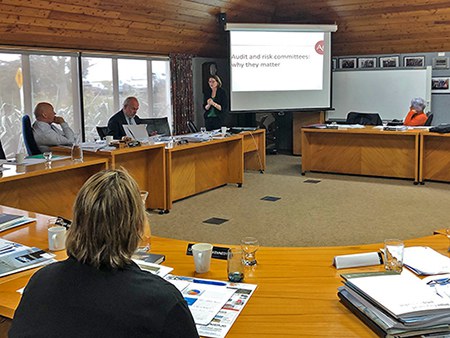Building and maintaining trust – the role of audit and risk committees
 The Office’s Local Government team has been on the road for the last month or so. From Northland to Southland, we’ve been running sessions with newly elected members of councils, including mayors, audit and risk committee chairpersons, and councillors. By Christmas, we’ll have delivered 19 induction sessions, speaking to about 300 elected members and council staff from 23 councils. We have a few more sessions to come next year, too.
The Office’s Local Government team has been on the road for the last month or so. From Northland to Southland, we’ve been running sessions with newly elected members of councils, including mayors, audit and risk committee chairpersons, and councillors. By Christmas, we’ll have delivered 19 induction sessions, speaking to about 300 elected members and council staff from 23 councils. We have a few more sessions to come next year, too.
We made the focus of our sessions about trust and confidence – what builds and maintains it, and what erodes it.
During the sessions, we asked elected members what erodes trust and confidence – poor performance or poor behaviour? In most cases, people went the poor behaviour way – though there is actually no right response. What it does highlight, though, is that communities might be forgiving when things don’t go to plan, but they are less forgiving when people and organisations behave badly – whether it’s not managing conflicts of interest, misusing resources, or not protecting against fraud.
As the saying goes, “Trust takes years to build, seconds to break, and forever to repair.”
In our view, the three key enablers for building and maintaining trust and confidence are:
- Competence (getting things right) – being seen to have internal processes and governance in place to give confidence to communities and to central government that councils can handle “bigger” issues.
- Reliability – consistent performance, compliance, and dependability.
- Honesty – truthfulness, integrity, and openness – doing the right things in the right way.
Council audit and risk committees have a part to play in building and maintaining trust and confidence – with your communities, and within your council. If an audit and risk committee is effective, it supports and enhances good governance and accountability to your community, which in turn builds trust and confidence in your council.
Forming a committee
Getting the right membership for an audit and risk committee is critical to achieving this. How effective the committee is largely comes down to the people on it.
The committee needs the right mix of skills and experience so it can provide the level and type of oversight that your council wants from it. An audit and risk committee benefits from having members who can bring a variety of perspectives and backgrounds, so issues are analysed and debated from different angles.
I noted in my previous blog that the core focus of your audit and risk committee should be on risk – perhaps it is better thought of as a risk and assurance committee.
Focusing on risk starts with being clear on your council’s strategic objectives and what might get in the way of achieving them. This will help determine what skill sets are needed on your committee, whether elected members have these skills, or whether there are gaps that need to be filled by independent members (more on them shortly).
Committee members typically need to collectively have expertise covering:
- finance and accounting, including financial reporting;
- broad governance, assurance, and risk management disciplines;
- an understanding of internal controls and assurance frameworks, including an understanding of the roles of internal and external audit;
- knowledge of the local government sector; and
- any other experience that is specific to your council’s needs.
The Committee also needs to bring an independent perspective so it can test and challenge your council.
It’s our aspiration that all councils have an effective audit and risk committee with at least two independent members – one being the chairperson. An independent chairperson is immensely valuable – they don’t have “skin in the game” and are not captured by politics. Because they’re impartial, they can more readily ask the hard questions, promote free and frank debate, support more strategic conversations, and ensure that the committee is not “down in the weeds”. It also gives councillors confidence knowing that they are receiving independent advice and assurance.
Watch out for our next blog on audit and risk committees in the new year. We’re planning on covering the role of committee members and chairpersons, and the relationship that council chief executives and management have with audit and risk committees.
Until then, if you have any questions, please don’t hesitate to contact me or a member of the Local Government team, or leave a comment below.
Find out more:
- Audit and risk committees: The value of differing views
- Have a look at the Office's guidance on audit and risk committees.
- Audit and risk committees: How do we make them more effective? [video]
- Using your audit and risk committee effectively [video]
- Join our Public Sector Audit Committees LinkedIn group
